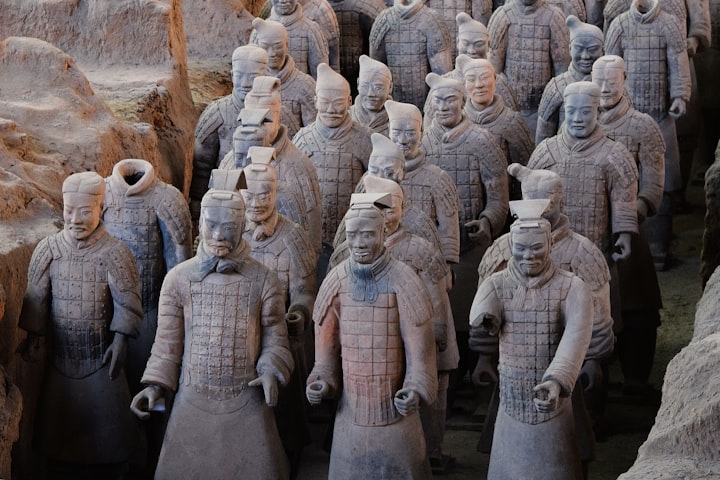The Cultural Revolution in China
From 1966 to 1976, China experienced the Cultural Revolution, a period of political and social upheaval orchestrated by Mao Zedong. The campaign resulted in widespread violence, persecution, and the destruction of cultural heritage, leaving a deep impact on Chinese society.

In the heartland of China, a country that had once been a cradle of ancient civilization and cultural heritage, a storm was brewing. It was the mid-1960s, and the Cultural Revolution was about to engulf the nation in a maelstrom of chaos and destruction.
Li Wei, a young student with dreams of becoming a writer, stood on the precipice of this revolution, unaware of the magnitude of the upheaval that lay ahead. He had grown up in a society shaped by Mao Zedong's communist ideology, where conformity and allegiance to the Party were considered virtues. But Li Wei had always possessed an independent spirit, a thirst for knowledge and creativity that defied the strictures of the regime.
One fateful day, the announcement came: the Cultural Revolution had begun. Students across the country, including Li Wei, were urged to rise up and "purge" the society of "bourgeois" and "counterrevolutionary" elements. The Red Guards, groups of zealous youth, emerged as the enforcers of this new order.
Li Wei watched in disbelief as his university transformed into a breeding ground of fanaticism and violence. Intellectuals and educators were publicly humiliated, their reputations tarnished, and their lives shattered. The pursuit of knowledge was replaced with a blind allegiance to Chairman Mao and his ideology.
Driven by a desire to protect his family, Li Wei reluctantly joined the ranks of the Red Guards. But as he witnessed the relentless persecution of his teachers and fellow students, his disillusionment grew. The dream of a just and egalitarian society had turned into a nightmare of fear and paranoia.
As the Cultural Revolution intensified, Li Wei's neighborhood became a battleground. Neighbors turned on each other, suspicion poisoning the air they once breathed in harmony. The red banners of revolution hung from every street corner, concealing the anguish and despair that gripped the community.
Li Wei's father, a respected historian, became a target of the revolutionaries. Accused of harboring "counterrevolutionary" ideas, he was forced to publicly confess his alleged crimes. The shame etched on his face as he denounced his own beliefs tore at Li Wei's heart, leaving an indelible scar that would haunt him for years to come.
The destruction of China's cultural heritage became a central tenet of the Cultural Revolution. Temples, libraries, and ancient artifacts were desecrated, deemed as remnants of a feudal past. Li Wei witnessed the burning of books and the toppling of statues, a sacrilege that seemed to erase centuries of history and wisdom.
In the midst of this madness, Li Wei found solace in a secret gathering of intellectuals who refused to let their voices be silenced. They met in the shadows, sharing forbidden books and engaging in impassioned debates about the future of their nation. It was within these clandestine meetings that Li Wei discovered a glimmer of hope, a reminder that not all was lost.
But hope was a fragile thing in those dark days. The power struggles within the Party, the shifting alliances, and the arbitrary denunciations meant that even the most loyal followers could find themselves branded as enemies of the revolution. Friends turned on friends, families torn apart, and the once vibrant society devolved into a landscape of fear and distrust.
As the Cultural Revolution finally came to an end in 1976, Li Wei stood amidst the ruins of his shattered dreams. The legacy of the revolution was a scarred nation, a fractured society struggling to heal the wounds inflicted by a decade of turmoil. The toll on the human spirit was immeasurable, leaving a generation scarred by the trauma they had endured.
Decades later, Li Wei, now an elderly man, reflects on the Cultural Revolution with a mixture of sorrow and resilience. He bears witness to the indomitable human spirit, the capacity for endurance and hope even in the face of unimaginable darkness. The scars of the revolution run deep, a reminder that the pursuit of ideology at the expense of humanity can bring about profound suffering.
Note: The story above is a work of fiction created to illustrate the subject of the Cultural Revolution in China. The characters and events portrayed are fictional, but they reflect the experiences of individuals affected by the revolution and the atmosphere of fear, persecution, and destruction that characterized that period.





Comments
There are no comments for this story
Be the first to respond and start the conversation.